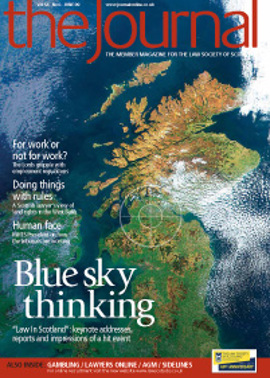Making openness work

“Once again this has been a pivotal year for the Society and for the profession”, the President, Richard Henderson, said in opening his review of the year at the AGM.
Referring to the “different perspective” his 21 month term of office had given him, Henderson turned straightaway to the “colossal impact” of the recession on the profession. “It has been a major focus for the Society as we have worked to support members in the downturn.”
Equally, he continued, it was the Society’s job constantly to look for improvement, in client services and in the profession’s response to challenge. The decision at last year’s AGM to adopt the Council’s policy on alternative business structures had influenced Government decisions on its policy in this area. But success for the profession in an increasingly competitive marketplace would depend on excellence in delivery,
key to which was the commitment to standards of excellence, with at their root the values and principles of the profession.
Those values and principles also underlay the “complex and far reaching” proposals in the education and training report before the meeting.
Turning to governance, the President said his predecessors deserved credit for recognising the need to plan and develop a strategic vision and review the Society’s governance; the work set in train over two years ago was now bearing fruit.
The new board and co-ordinating committees would ensure better co-ordination and management of the Society’s work; the next stage was to look at the structure of Council itself and ensure that it was the representative voice of the profession. “There will be significant change over the next year and it is intended that at next year’s AGM the profession have the opportunity to debate and vote on a new constitution for the Society.”
Henderson then paid tribute to the Society’s staff, who had put in so much work over the past year, and to the energy and commitment of new Chief Executive, Lorna Jack. “Her appointment was a key event of the past year and of the past 60 years. It signals the broadening vision of the Society and I believe of its developing success across the breadth of its activities into the future.”
The President acknowledged that there remained issues of difficulty and perhaps tension. One was the Scottish Legal Complaints Commission, which had left the Society still having to handle many service complaints for the time being, with implications for costs and members’ fees. Another was issues concerning solicitor advocates, as to which he refrained from comment beyond restating his belief that “we are better served by discussion and persuasion rather than megaphone diplomacy”.
He referred finally to the Society’s new international strategy, “to engage with those who can support the Society to grow development opportunities which benefit the profession at home as well as abroad”. But, he added, “of far greater importance is the regard in which we are held by others as a profession… I believe that as a result of work done trying better to understand the benefits of engaging here and abroad, we are in a better state to focus our activities”.
He concluded simply: “It has been a privilege to hold office as President of the Society. Thank you.”
Guarantee fund warning
Claims on the Guarantee Fund were likely to rise as a result of the recession, convener Alistair Morris warned members. While reserves had increased and assets had been converted into cash ahead of the collapse in values, it was likely that payments, which had remained at a low level to date, would rise sharply in the coming years.
He also advised that inspection policy is to become more risk based, with a focus on the type and detail rather than the volume of inspections.Negotiations are taking place
with the Scottish Government as to whether the fund’s liability can be capped in the event of exposure to a “catastrophic” claim.
Morris also confirmed that the proposed amendments to the Accounts Rules had been withdrawn following representations that they were too prescriptive. He accepted that the current process of consultation on draft rules, albeit with practising solicitors in the form of committee and Council members, should be reconsidered in favour of wider circulation.
In this issue
- Spanish executry law – cross border issues
- The Scottish Parliament’s Emergency Bill procedure
- One year on
- Unequal before the law (1)
- Ian Smart's inauguration speech
- Your new First XI
- Dangerous loophole
- Unlocking the rule of law
- Our guiding light
- A hit for the conference
- Of chairs, trains and escalators
- Unequal before the law
- Matters of the mind
- New game, new rules
- Advance on all fronts
- Making openness work
- The First XI
- Society parleys with the OFT
- Professional Practice Committee
- Committees: the unsung heroes
- Find a client?
- Platform for success?
- Ask Ash
- Constant foe
- Killer question
- A time to be inventive
- Deep pockets required?
- Win some, lose some
- New client - new problems
- Website review
- Book reviews
- A business view






